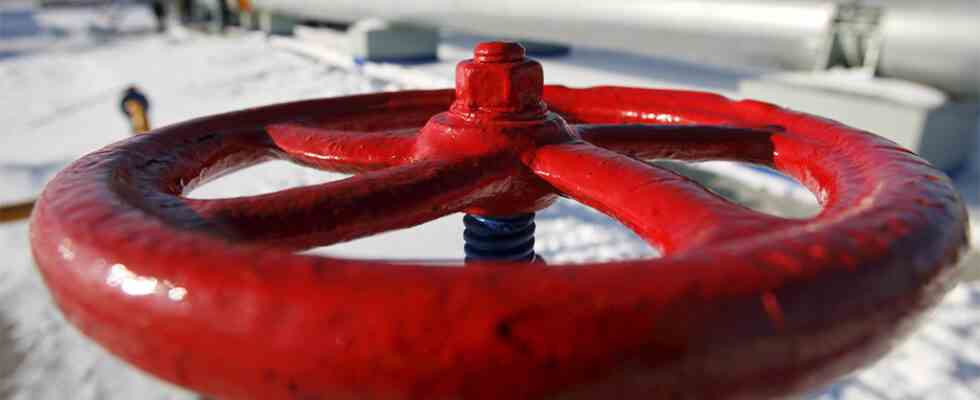Status: 13.10.2022 11:18 am
France has been supplying gas to Germany since today and in return receives electricity if the situation requires it. Meanwhile, the German gas storage facilities are almost completely full – and the EU is planning joint purchases.
During the energy crisis, France started supplying gas to Germany. The French gas network operator GRTgaz announced that gas flowed from France to Germany for the first time at 6 a.m. today via the border town of Medelsheim in Saarland. According to this, France will initially supply gas with an energy output of 31 gigawatt hours per day.
French President Emmanuel Macron and Chancellor Olaf Scholz (SPD) agreed at the beginning of September on mutual energy supplies for the coming winter. France wants to export gas to Germany and get more electricity in return, should the situation in winter make it necessary. Due to maintenance work and technical problems, only 30 of the 56 nuclear reactors in the neighboring country are currently in operation.
“Increased gas smell reports” possible
How much gas will actually flow also depends on how many individual customers on the German side order something. For example, the Homburger Stadtwerke confirmed this SR already that they want to take gas. In principle, it has been agreed that up to 100 gigawatt hours a day should flow from France to Germany in the future. Depending on the season, this corresponds to two to five percent of consumption in Germany. The deal uses a pipeline through which gas previously flowed in the opposite direction – including from Russia. It is part of the Central European gas pipeline (Megal), which runs across southern Germany towards the Czech Republic.
Since the pipeline was originally only intended for the delivery of gas from Germany to France and not the other way around, adjustments had to be made first. GRTgaz explained that these were made in view of the sharp drop in Russian gas supplies to Europe and as part of European solidarity for energy security. With electricity, on the other hand, it was easier: the two countries have been connected via the European grid for a long time. Germany was already supplying surplus wind energy to the neighboring country this summer.
A technical problem, however, is that the French natural gas is already mixed with sulphurous odors to detect leaks more quickly. In Germany, such substances are only added when the gas, which is actually odorless, goes to households. In individual cases, it cannot be ruled out that “particularly special and sensitive consumer applications in industry react sensitively to the additional sulfur content in natural gas,” according to the Saarland Ministry of Economic Affairs. The network operators in Saarland and Rhineland-Palatinate should be informed about the deliveries from France the day before so that the addition of odorous substances can be adjusted or suspended. The Ministry of Economic Affairs considers “increased reports of the smell of gas” to be possible.
EU aims for joint gas purchases
Beyond the German-French cooperation, the states in Europe are apparently moving closer together in the fight against the energy crisis. The EU wants to introduce joint natural gas purchases and an alternative reference price. The Czech Industry Minister Jozef Sikela announced a corresponding agreement yesterday in Prague after a meeting of EU energy ministers.
The EU Commission will present appropriate proposals next week, said EU Energy Commissioner Kadri Simson. However, there was still no agreement on the planned gas price cap. Germany is one of the countries that reject the project. According to the Czech information, the EU states should then decide on the package of measures in November. “I firmly believe that today’s meeting has helped to bridge the differences between member states,” Sikela said.
Economics Minister Robert Habeck (Greens) had previously spoken out in favor of “strengthening Europe’s joint purchasing power through the joint purchasing platform for gas, stronger savings targets in Europe and regulatory simplifications to massively accelerate renewable energies”. The start of joint purchases is aimed for in the coming months, it said.
November target for gas storage levels almost reached
Meanwhile, the filling of Germany’s gas storage facilities is making progress despite the lack of deliveries from Russia. As the website of Europe’s gas infrastructure operators (GIE) revealed last night, the fill level rose by 0.28 percentage points to 94.97 percent within 24 hours. According to a federal regulation, the facilities must be 95 percent full by November 1st. This value has now almost been reached on average for all systems.
However, the ordinance stipulates that every storage facility must comply with the requirement. This is not the case – some plants are already above this, but others are still below. In particular, the most important German storage facility in Rehden is only 83.24 percent utilized. The storage should help so that Germany’s companies, authorities and households get enough energy in the upcoming heating season. In mathematical terms, however, the full gas storage facilities would only suffice for around two winter months to cover domestic demand. Therefore, according to the Federal Network Agency, imports via liquid gas terminals and energy saving remain the order of the day.
Some consumers can breathe a sigh of relief for the time being in view of the drastic increase in gas prices. For example, customers of the energy supplier Mainova do not have to accept higher down payments in the tariff for the basic natural gas supply after the controversial gas levy has been abolished. Although the increases were announced to customers in mid-August with a letter effective October 1, politicians then decided to first reduce VAT and then to withdraw the gas levy. Therefore, the announced increase in the discounts, which had not yet been implemented. The Darmstadt-based supplier Entega also stated that the gas prices for customers would automatically be reduced by the costs of the originally planned levy.

